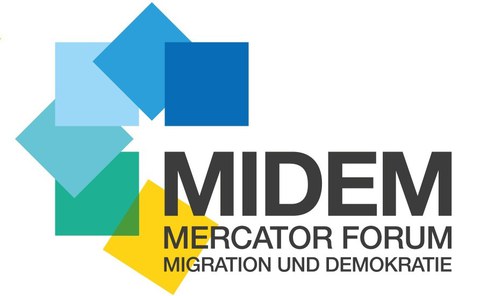Dec 06, 2022
5th MIDEM Annual Study Europe and Refugee Migration from Ukraine
Solidarity with Ukraine and Ukrainian refugees continues – but not at any price / other refugees strongly rejected
New MIDEM Annual Study uncovers differences in attitude towards migration in Europe
A large majority of Europeans are in favor of taking in Ukrainian refugees. However, solidarity with Ukraine could shrink significantly due to the social and economic repercussions. Moreover, it would seem that this sentiment of solidarity does not extend equally to all refugees. This has been uncovered by a new study conducted by the Mercator Forum for Migration and Democracy (MIDEM), which was published today in Berlin. The results of this representative survey, which was conducted in cooperation with the polling institute YouGov, painted a rather mixed picture of European attitudes towards migration and Ukraine. While there is great willingness to take in and help Ukrainian refugees, skepticism prevails with respect to refugees from other crisis regions. People have particularly strong reservations toward immigrants from predominantly Muslim countries. Respondents expressed greater concerns about these groups’ ability to integrate.
No paradigm shift in dealing with refugees
For MIDEM Director Professor Hans Vorländer, one thing is certain: “Germany as well as Central and Eastern European Countries such as Poland have shown great willingness to receive Ukrainian refugees. Civil society has done an enormous amount in this respect. The EU has also shown its solidarity, applying the Temporary Protection Directive for the first time in history. However, this does not represent a general paradigm shift in European refugee and migration policy. Acceptance of Ukrainian refugees does not equate to acceptance of all refugees.”
In Europe, migration goes hand in hand with the desire for control and limitation. This is also true for countries that have logged a trend in recent years of a greater acceptance of migration. In Sweden, for example, the majority lies particularly clearly with those in favor of fundamentally limiting immigration. “The vast majority of respondents believe that migration is the most politically contentious issue – far surpassing economic and climate issues,” Hans Vorländer explains. Only in countries such as Poland and the Czech Republic, which have each hosted a particularly large number of refugees from Ukraine, does the topic of migration receive a more moderate ranking.
“The topic of migration obviously remains socially explosive,” says Christiane von Websky, Director of the Centre for Participation and Cohesion at Stiftung Mercator. “Our goal is to prevent social division. This study makes a key contribution by identifying dangers to political decision-makers and taking a differentiated look at Europe,” says von Websky. Stiftung Mercator co-initiated MIDEM in 2017 and has since been funding the research center at Technische Universität Dresden.
Social and economic repercussions could weaken support for Ukraine
There is evidence that support for Ukraine could crumble as a consequence of the energy crisis. Only a narrow relative majority (40 percent) of those surveyed by MIDEM are in favor of continuing support for Ukraine, even despite the social and economic repercussions. At the same time, 39 percent of respondents hold the opposing view, asserting that support for Ukraine should be curtailed because of the negative consequences. The lowest recorded willingness to continue supporting Ukraine to the same extent, especially in light of the growing economic burden, is in the Czech Republic and Hungary – but also in eastern Germany. “This means,” infers MIDEM Director Hans Vorländer, “that solidarity with Ukraine could really be put to the test in the next few months.”
Differences between eastern and western Germany
In general, significant differences in terms of war and migration between eastern and western Germany have become apparent. For example, the survey shows that in the east, more than a third of respondents see NATO as partly to blame for the war; the Czech Republic and Hungary express a similar sentiment. The mood in eastern Germany thus differs significantly from average sentiments across the EU. On the whole, inhabitants of eastern Germany tend to agree more with statements that are critical of migration than their western counterparts.
The 5th Annual Study of the Mercator Forum for Migration and Democracy (MIDEM) was presented at a press conference on December 5, 2022, and is available for Download (in German).
Method
The MIDEM study comprises qualitative and quantitative research. The results of the quantitative research are based on a survey conducted by MIDEM in cooperation with the polling institute YouGov between September 16 and October 12, 2022. A total of 20,403 people were interviewed in ten EU countries (the Czech Republic, France, Germany, Greece, Hungary, Italy, the Netherlands, Poland, Sweden and Spain,) using regional online access panels. The qualitative aspect of the study provides insights and a background analysis on the social and political processing of Ukrainian refugee migration in some of the countries most affected by it: the Czech Republic, Germany, Hungary, Poland and Slovakia. For this purpose, the study evaluated surveys, political discourses and political-administrative measures.
About MIDEM
The Mercator Forum for Migration and Democracy (MIDEM) is a research center at Technische Universität Dresden, funded by Stiftung Mercator. MIDEM analyzes how migration both shapes and is shaped by democratic policies, institutions and cultures. It investigates forms, instruments and processes of politically processing migration in democratic societies – in individual countries and in a comparative view of Europe.
You can find further information about MIDEM on our website.
Media Inquiries:
Johanna Haupt
Communications Manager
Tel.: +49 351 463-35800
Twitter: @forumMIDEM
Mathilde Rave
Transfer and Communications Manager
Tel.: +49 351 463-35800
Secretary’s Office
Mercator Forum Migration and Democracy (MIDEM)
TU Dresden
Tel.: +49 351 463-35811

